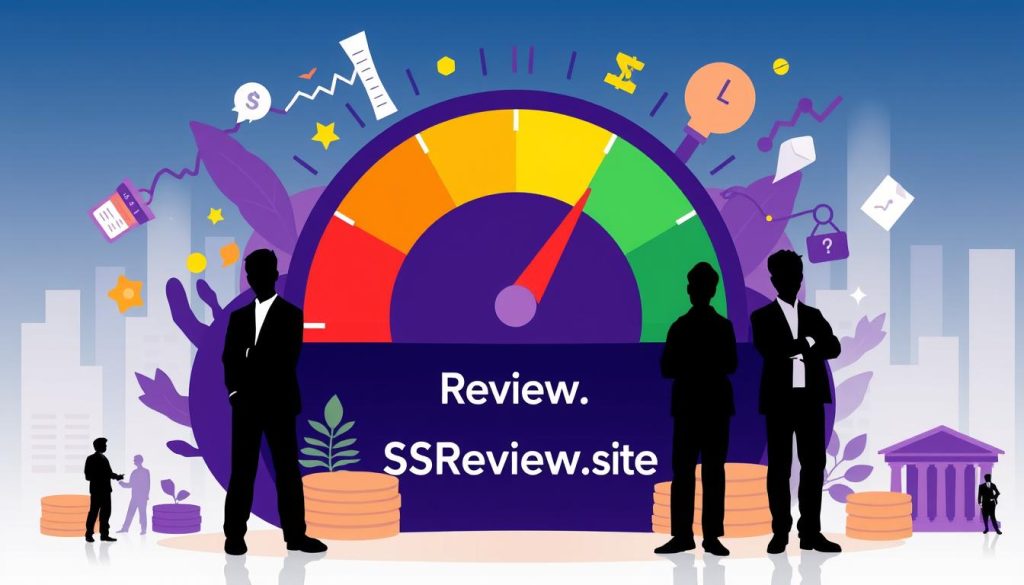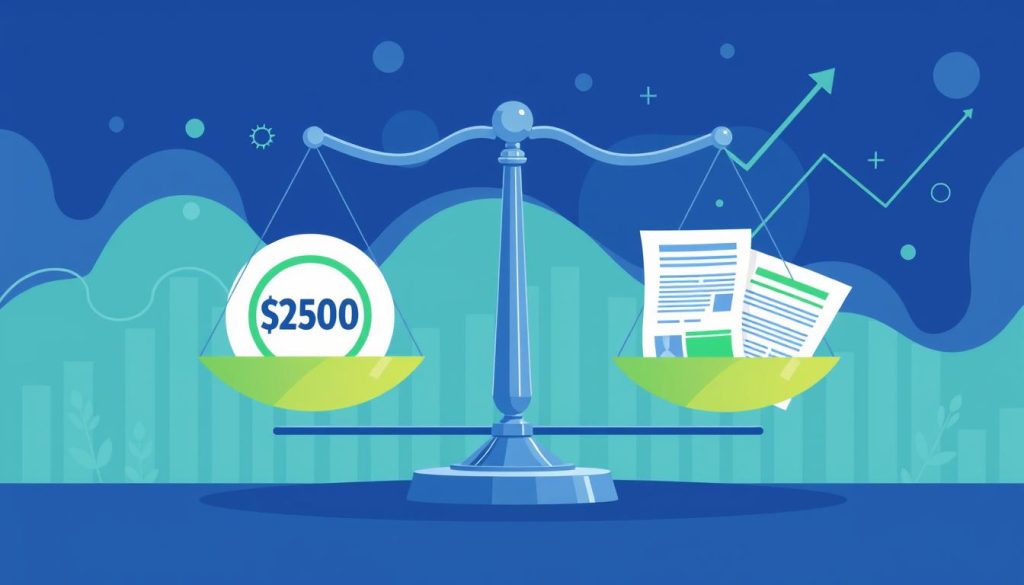In today’s world, knowing your credit score is key if you want a loan. These scores show how good you are at managing money. Lenders use them to figure out if they should lend you money.
So, understanding your credit score is important. It helps you get a loan and the terms that come with it.
Key Takeaways
- Understanding credit scores is critical for loan success.
- Credit scores significantly influence your loan application outcomes.
- Lenders assess creditworthiness based on credit scores.
- A higher credit score typically leads to better loan terms.
- Regular monitoring of your credit score is advisable.
- Improving your credit score can enhance your borrowing capacity.
Understanding Credit Scores: How They Affect Your Loan Applications
Knowing about credit scores is key for anyone dealing with loan applications. A credit score shows how likely you are to pay back a loan on time. Learning how these scores work can help you get better loan terms.
What is a Credit Score?
A credit score is a three-digit number that shows your credit history. It ranges from 300 to 850, with higher scores meaning you’re more trustworthy. Lenders use these scores to decide if they should lend to you. People with high scores often get better interest rates.
Components of a Credit Score
Several important factors go into your credit score. Knowing these can help you improve your financial health. The main parts are:
- Payment History: This is the biggest factor, making up about 35% of your score. It looks at if you’ve paid on time.
- Credit Utilization: This counts for about 30% of your score. It shows how much of your credit you’re using.
- Length of Credit History: A longer history helps about 15% of your score. It shows you’re experienced with credit.
- Types of Credit Used: Having different types of credit helps 10% of your score. This includes credit cards, mortgages, and more.
- New Credit Inquiries: Too many inquiries in a short time can hurt 10% of your score. It suggests you might be taking on too much risk.

The Importance of Credit Scores in Loan Applications
Knowing how credit scores work is key for both lenders and borrowers. Lenders look at credit scores to see if you’re a good risk. A good credit score means you’re likely to pay back loans on time.
Why Lenders Care About Credit Scores
Lenders use credit scores to decide if they should lend to you. A high score shows you’re financially responsible. This can lead to better loan terms and faster approval.
- Credit scores predict repayment habits, giving lenders confidence.
- A strong score often means better loan terms.
- Lenders can quickly tell who’s a high risk and who’s not.
The Role of Credit Scores in Interest Rates
Credit scores also affect the interest rates you get. People with higher scores often get lower rates. This can save you a lot of money over time.
| Credit Score Range | Typical Interest Rate (%) | Loan Approval Chances |
|---|---|---|
| 300-579 | 10-20 | Low |
| 580-669 | 7-10 | Moderate |
| 670-739 | 5-7 | High |
| 740-799 | 3-5 | Very High |
| 800-850 | 2-3 | Excellent |

Credit Score Impact on Loan Applications
Knowing how your credit score affects loan applications is key to getting good financing terms. Lenders check your credit score to see if you’re a good risk. This check can decide if you get a loan and what interest rate you’ll pay.
How Credit Scores Influence Loan Approval
A higher credit score means you’re more likely to get a loan. Lenders sort applicants into groups based on their credit score. Prime applicants get the best deals, while subprime borrowers might pay more or not get a loan at all.
Lenders use certain scores to decide if you’re eligible for a loan. This score shows how risky it is to lend to you.
Common Thresholds for Loan Eligibility
Here are the score ranges lenders use to judge borrowers:
| Credit Score Range | Category | Typical Loan Interest Rates |
|---|---|---|
| 300 – 579 | Subprime | 7% – 15% |
| 580 – 669 | Fair | 5% – 7% |
| 670 – 739 | Good | 3% – 5% |
| 740 – 850 | Excellent | 2% – 3% |
Understanding these score ranges helps you manage your credit score better. Keeping an eye on your credit and making smart financial choices can improve your chances of getting a loan with good terms.
Key Factors Affecting Your Credit Score
Knowing what affects your credit score is key for better loan chances. Each factor plays a big role in showing how creditworthy you are. Here are the main things that shape your credit score.
Payment History
Payment history is the biggest part of your credit score, making up about 35%. Late or missed payments can really hurt your score. But, paying on time helps a lot. It makes your credit look better and boosts your loan approval odds.
Credit Utilization Ratio
This part counts for about 30% of your score. It’s about how much credit you use compared to what you have. Try to keep this ratio under 30% for a good score. Using less credit shows you handle it well, which helps your score.
Length of Credit History
The age of your credit accounts adds up to about 15% of your score. Lenders like people with long credit histories. It shows you’re good at managing credit over time. Keeping old accounts open is important, even if you don’t use them.
How to Improve Your Credit Score for Loans
Improving your credit score is key to getting good loan terms. There are many ways to boost your score, which affects your loan chances. By using these tips, you can improve your financial health and get loans at better rates.
Paying Bills on Time
One top way to up your credit score is to pay bills on time. Late payments hurt your score and cost you money. Keep track of due dates and set reminders to pay on time.
Reducing Debt and Credit Card Balances
Lowering debt, like credit card balances, really helps your score. Try to use less than 30% of your credit limit. This shows you’re good with money, which helps your loan chances.
Limiting New Credit Applications
Too many new credit applications can lower your score. Try not to apply for many loans at once. This keeps your credit strong while you work on your score.
| Strategy | Benefits |
|---|---|
| Pay Bills on Time | Prevents late fees and maintains positive payment history. |
| Reduce Debt | Lower credit utilization ratio enhances creditworthiness. |
| Limit New Credit Applications | Reduces hard inquiries that can lower credit scores. |
Understanding Creditworthiness Assessment
Creditworthiness assessment is key in the loan approval process. Lenders check your credit report for several factors to see if you can repay a loan. Knowing what lenders look for can help you improve your chances of getting a loan.
What Lenders Look For in Your Credit Report
Lenders focus on certain parts of your credit report. These parts are very important to them:
- Payment History: Making payments on time shows you’re reliable. Missing payments can be a problem.
- Outstanding Debts: How much debt you have tells lenders about your financial situation and their risk.
- Credit Accounts: The types and number of credit accounts show how well you manage credit.
- Public Records: Bankruptcies or foreclosures can really hurt your credit score and what lenders think of you.
Knowing about these parts of credit reports can help you understand your credit score better. It can also guide you in improving your creditworthiness.
| Aspect | Importance |
|---|---|
| Payment History | Major factor affecting credit score; includes on-time payments and defaults. |
| Outstanding Debts | Shows total debt levels, indicating the borrower’s financial burden. |
| Credit Accounts | Variety and management of accounts demonstrate credit management skills. |
| Public Records | Presents significant risks that can deter lenders from approving loans. |
Credit Score and Loan Decisions: Common Misconceptions
Understanding credit scores is key for making smart loan choices. Many people believe false things that can hurt their chances of getting a loan. Knowing the truth can help you make better choices.
Separating Myths from Reality
Many think checking their credit score lowers it. But, checking your own score is safe and doesn’t affect your rating. Another myth is that credit scores can quickly improve. But, building good credit takes time and effort.
The Risks of Ignoring Your Credit Score
Ignoring your credit score can lead to big problems. You might miss out on good loan deals or even get denied. Keeping an eye on your score helps you make better choices and improve your credit.
| Myth | Fact |
|---|---|
| Checking your credit score hurts it | Checking your own score is a soft inquiry and has no negative impact. |
| Credit scores can be fixed overnight | Credit scores improve through consistent responsible financial behavior over time. |
| Only lenders see your credit score | Consumers should regularly check their scores to stay informed. |
| Ignoring credit scores is harmless | Neglecting to monitor can result in missed opportunities and higher loan costs. |
Conclusion
Understanding credit scores is key when you’re looking to get a loan. These scores play a big role in how lenders see you. A good score can lead to better loan terms, while a bad score might mean higher rates or even a no.
Working on your credit can really help your financial health. Paying bills on time, paying off debts, and keeping an eye on your credit use are all important steps. By doing these things, you can improve your credit score and open up more loan options for yourself.
Knowing about credit scores helps you make smarter money choices. It can help you get loans that are better for you. This knowledge is a powerful tool for shaping your financial future.
FAQ
What is a credit score?
A credit score shows how good you are at managing money. It’s based on how you handle loans and bills. It’s key for getting loans.
How do credit scores impact loan applications?
Credit scores matter a lot when you apply for loans. They show if you’ll pay back on time. A better score means better loan terms.
What factors contribute to a credit score?
Your credit score depends on a few things. Payment history counts for 35%. How much you use your credit is 30%. The length of your credit history is 15%. The types of credit you have are 10%. And, recent credit checks are 10%.
Why do lenders care about credit scores?
Lenders look at credit scores to see if you’re a safe bet. A high score means you’re less likely to default. This helps them decide on loans and rates.
What are common credit score thresholds for loan eligibility?
Lenders group people into categories based on scores. Scores above 700 are usually good. This affects if you get a loan and the rate you get.
What are some ways to improve my credit score before applying for a loan?
To boost your score, pay bills on time. Try to lower your debt and credit card balances. Also, avoid too many new credit checks.
How do lenders evaluate my creditworthiness?
Lenders check your credit reports. They look at your payment history, debts, and credit accounts. They also check for bankruptcies.
What are some misconceptions about credit scores?
Some think checking your score hurts it. Others believe quick fixes can instantly improve it. But, building a good credit score takes time and effort.
How do I check my credit score?
You can check your score online. Use sites like Experian, TransUnion, and Equifax. You can also get a free report once a year.
Can I get approved for a loan with a low credit score?
Yes, you can get a loan with a low score. But, the terms might not be as good. It’s better to try to improve your score first.
Read Also: Exploring P2P Lending Platforms: Benefits & Drawbacks




